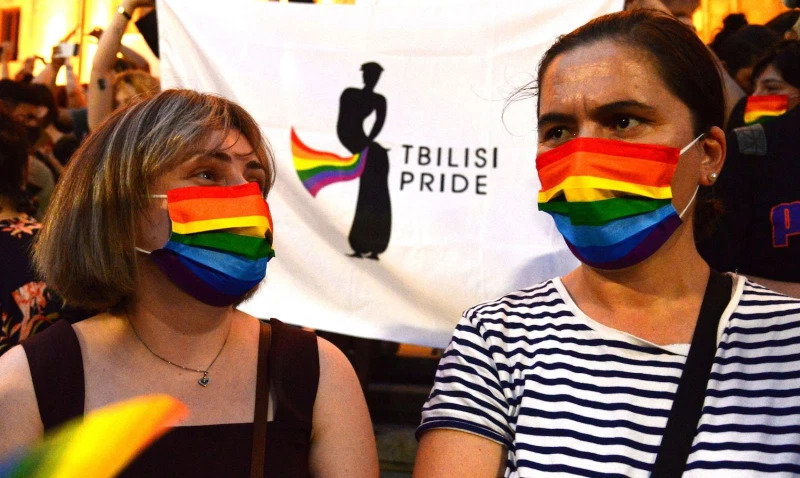For example, Gaddafi, once described by British Prime Minister Tony Blair as “courageous” and by US presidential candidate John McCain as an “interesting man”, the man willingly hugged by Western leaders, became a “devil” in just a few months, was branded as tyrant and his brutal assassination was applauded by everyone. In other words, it comes as no surprise to anyone that a force supported by the West today can be criticized, insulted and dethroned by the West tomorrow.
Again, all this can somehow be understood and accepted. After the end of the Cold War, the West has been trying to prove the ethical and moral superiority of its values to the whole world. Governments that disagree with these values are oppressed, they become subjects of reports, they are “condemned”, criticized and insulted, and when all this does not work, they are branded as rogues and are overthrown. Not all—just “the others”. The West’s most well-known hypocrisy is that it distinguishes between “our own” and “the others,” two groups treated differently for the same kind of actions, often even turning a blind eye to the behavior of “our own”.
In his novel “The Spy Who Came in from the Cold” (adapted for the big screen by Martin Ritt in 1965), John Le Carre concludes that the West is hypocritical, that the concept of democracy works for certain groups and does not extend to all of humanity. The book also highlights the possibility of using brutal, undemocratic methods against those who do not belong to the system—to protect this system.
It even came to a point where authoritarian regimes have begun to emerge not only outside the European Union, but also within the EU itself, and the EU cannot make up its mind about the best way to deal with that. For example, no matter how much the EU’s political elite disapprove of the government of Viktor Orbán, who returned to the post of Prime Minister (head of government) of Hungary in 2010, they do not show it. They do not like Orbán’s policy and rhetoric, especially his admiration for the rise of China, his sympathy for the political elites of Turkey, Azerbaijan and Kazakhstan, and his views on changing the EU form of government. Again, the EU says to Hungary and Orban, “you are one of our own”, and does not dig too deep.
The protection of LGBT rights has been one of the EU’s red lines especially in recent years, and Orbán has taken a tough stance on the issue. Article 21 of the EU Charter of Human Rights, adopted in 2000, prohibits any form of discrimination on the basis of sexual orientation. In June, the Hungarian parliament passed a law banning the portrayal of homosexuality and sex reassignment in school education material and TV programs for children under the age of 18. At a meeting of European affairs ministers, 16 Member States out of 27 voiced their disapproval of this anti-LGBT law on the initiative of Belgium, the Netherlands and Luxembourg (Benelux countries).
Along with Hungary, Poland is beginning to show signs of authoritarianism, and Europe is becoming more “concerned.” In the 2020 Freedom House Index, Poland has even been removed from the list of full democracies and kicked to the back rows. Thus, Poland, which previously ranked 18th in the democracy index, ranks 62nd in 2020. Among the main factors influencing this are the launch of the anti-LGBT movement in Poland in 2019, the development of LGBT ideology-free zones in hundreds of southern and southeastern municipalities by 2020. In December 2019, the European Parliament passed a resolution strongly condemning Poland for setting up these zones.
However, none of these resolutions, statements and appeals are aimed at criticizing, insulting or threatening those states (“our own”) and their governance, but merely contain the EU’s demands and proposals to change the current situation. Similar or even milder actions of ” the others”, meanwhile, stand out to them like a sore thumb.
Another aspect of the Western hypocrisy is manifested in the media. The media tries to manipulate people’s thoughts and feelings, now hiding the truth, now giving it to the audience in a distorted form. That is how it plays a role in shaping people’s opinion on particular issues. For example, in 1991, the difference between the Gulf War people followed on CNN and the Gulf War as presented by the Iraqi government was 400,000 dead Iraqis.[1] The purpose was probably to protect the image of the West from damage. After all, so many people were exterminated by the Western coalition. Or, for example, at the 1988 Seoul Summer Olympics, athlete Robert Dover made his homosexual identity public right before the competition, after which the LGBT ban began to be lifted in the hearts of the masses. In general, the media has played a major role in changing public attitudes towards LGBT people.[2] However, it is the same Western media that determines which LGBT events will be covered and which will be ignored, or how they will be presented.
Only a couple of articles appeared in the Western media about the disruption of the LGBT Pride rally in Georgia on July 4, 2021, the physical violence against its participants, and the attack on LGBT headquarters. The incident was condemned, a number of embassies of EU countries in Tbilisi spoke out in a joint statement, calling such discrimination against LGBT people “unacceptable.” However, there is almost no Western media that has not written about the rainbow flag pulled out of the hands of two foreign (Danish) citizens (to be returned to them later) who raised one during the Czech Republic–Denmark match of the UEFA 2020 Championship in Azerbaijan on July 3, 2021. Most of these articles discuss and criticize the state of human rights and democracy in Azerbaijan, rather than describe the event itself. That is, the incident with the flag in Baku caused a much greater resonance than the events in Tbilisi, where something much more serious (actual violence) happened. Azerbaijan ranks last among 49 European countries in the Rainbow Map prepared by ILGA (International Lesbian, Gay, Bisexual, Trans and Intersex Association).
The most hypocritical position was shown by the resource of the Norwegian Helsinki Committee. Norwegian Mina Wikshåland Skouen and Berit Lindeman published an article on the “attacks on LGBTI+ persons in Azerbaijan” during the violent attacks in Tbilisi, as homosexuals and journalists were being beaten, completely ignoring the fact that not a single Georgia-related report was featured in the LGBT section of the site. A number of Azerbaijani gay people even protested against this demonstrative provocation, asking the authors to name the reason for this double standard. The Norwegian Helsinki Committee’s response was brief: “We do not compare Azerbaijan and Georgia.” Unfortunately, as this article was being written (July 11, 2021), we received sad news from Georgia. Lekso Lashkarava, the cameraman who had been beaten and gravely injured in the anti-LGBT attacks in Tbilisi on July 5, died in hospital.
It is no coincidence that Western politicians and media today are putting pressure on Azerbaijan, calling it to secure LGBT rights. However, a comparison of the LGBT-related facts, based on the 2019 report drafted by ILGA itself, shows that there is no significant difference in terms of LGBT rights in Azerbaijan and many other European countries. For example, in 2001, Azerbaijan abolished the legal penalties against homosexuality. In Armenia, it happened two years later, in 2003. As can be seen from the table below, there are few European countries that allow same-sex marriage (Austria, Belgium, Denmark, Finland, France, Iceland, Ireland, Luxembourg, Malta, the Netherlands, Norway, Portugal, Spain, Sweden, and the United Kingdom), and even in these countries, hate crimes against LGBT people are committed. In other words, the attitude to LGBT people in Azerbaijan is no different from that in many of these countries. The real reason for the criticism of and pressure on Azerbaijan is simply and only hypocrisy. At any rate, regardless of the situation with LGBT rights in Azerbaijan, it does not affect Azerbaijan’s political, economic and energy cooperation with the West. They show their “concern” from a safe distance, while the deep politics behind closed doors continues. That is, there is no need to take this hypocrisy personally and lose sleep over it.
Comparison of LGBT rights in 49 European countries
Source: ILGA: Lucas Ramon Mendos (2019). State-Sponsored Homophobia: Global Legislation Overview Update, Geneva: ILGA.
[1] Herman, E.S. (2004). Medyada İkiyüzlülük: Propoganda Çağında Haberleri Deşifre Etmek, (Çev. Nur Nirven) (Beyond Hypocrisy: Decoding the News in an Age of Propaganda, Turkish translation), Chiviyazıları Yayınevi, İstanbul, p. 10
[2] Lan .M and Cheng, Y. (2020). “The Role of the Media in LGBT Rights Movements Around the World”, 2020 4th International Seminar on Education, Management and Social Sciences, Atlantis Press SARL, p. 418
Aze.Media
If you want to contribute and have specific expertise, please contact us at [email protected]















